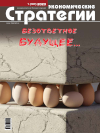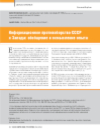Information Warfare of the USSR and the West: Generalization and Experience Comprehension
DOI: 10.33917/es-1.187.2023.98-109
The article presents a factual retrospective review of the public consciousness deformation as a result of successful subversive
ideological and psychological work against the USSR, carried out by the United States in the second half of the 20th century, called the Cold War. Evidence from documents and memoirs of the events participants allows us to realize the continuing relevance of the systemic danger of a destructive information impact for modern Russia.
References:
1. Klain R. TsRU ot Ruzvel’ta do Reigana [CIA from Roosevelt to Reagan]. New York, 1988, p. 166.
2. Lainbardzher P. Psikhologicheskaya voina. Teoriya i praktika obrabotki massovogo soznaniya [Psychological Warfare. Theory and Practice of Processing Mass Consciousness]. Moscow, 2013, pp. 98–120, 121–164.
3. Pechataetsya po izd.: SShA: ekonomika, politika, ideologiya, 1989, no 12, per. G.V. Zdornykh.
4. Etzold T.H., Gaddis J.L. Containment: Documents on American Policy and Strategy, 1945-1950, NSC 20/1 (pages 173-203) // Direktiva SNB SShA 20/1 ot 18 avgusta 1948 g.
5. Khinshtein A. Kak ubivayut Rossiyu [How They Kill Russia]. Moscow, Abris, OLMA, 2018, 448 p.
6. Khlobustov O.M. KGB SSSR 1954–1991. Tainy gibeli Velikoi derzhavy [KGB of the USSR 1954-1991. Secrets of the Death of the Great Power]. Moscow, 2013, pp. 73.
7. Khlobustov O.M. Eshche raz o «preslovutom plane Dallesa» [Once Again About the “Notorious Plan of Dulles”]. Trudy Obshchestva izucheniya istorii otechestvennykh spetssluzhb. T. I. Moscow, 2006, pp. 221–220.
8. Shveitser M. POBEDA [Victory]. Minsk, 1995, pp. 77.
9. Anan’ev A.A. Prizvanie Ryurikovichei, ili Tysyacheletnyaya zagadka Rossii [Vocation of the Rurik Dynasty or the Millennium Mystery of Russia]. Moscow, 1996, p. 304.
10. Zhdanov A.A. O mezhdunarodnom polozhenii: Doklad na I soveshchanii Kommunisticheskogo informbyuro 25 sentyabrya 1947 g. [On the International Situation: Report at the 1st Meeting of the Communist Information Bureau on September 25, 1947.]. Rossiiskaya gosudarstvennaya biblioteka, available at: https://search.rsl.ru/ru/record/01005794410
11. Glavnyi protivnik: Dokumenty amerikanskoi vneshnei politiki i strategii 1945–1950 gg. [The Chief Enemy: Documents of American Foreign Policy and Strategy 1945–1950.] Moscow, 2006.
12. Pocheptsov G. Informatsionnye voiny. Osnovy voenno-kommunikativnykh issledovanii [Information Wars. Fundamentals of Military Communication Studies]. Elektronnaya biblioteka RuLit, available at: https://www.rulit.me/books/informacionnye-vojny-osnovy-voenno-kommunikativnyh-issledovanij-read-350904-1.html
13. Khlobustov O.M. Fenomen Andropova: lichnost’ i ee rol’ v istorii / Istoricheskie chteniya na ul. Andropova, 5. Istoriya organov bezopasnosti: materialy VI mezhdunarodnoi nauchnoi konferentsii, posvyashchennoi 70-letiyu Pobedy sovetskogo naroda v Velikoi Otechestvennoi voine 1941–1945 gg. [The Andropov Phenomenon: Personality and its Role in History / Historical Readings on the Andropova street, 5. History of Security Agencies: Materials of the VI International Scientific Conference Dedicated to the 70th Anniversary of the Victory of the Soviet People in the Great Patriotic War of 1941–1945.]. Petrozavodsk, 2016. S. 257.
14. Bobkov F.D. Poslednie 20 let. Zapiski nachal’nika politicheskoi kontrrazvedki [Last 20 Years. Notes of the Head of Political Counterintelligence]. Moscow, 2006, pp. 45, 115.
15. Makarevich E.F. Sekretnaya agentura: Shtatnym i neshtatnym sotrudnikam posvyashchaetsya [Secret Agents: Dedicated to Full-time and Freelance Employees]. Moscow, 2007.



